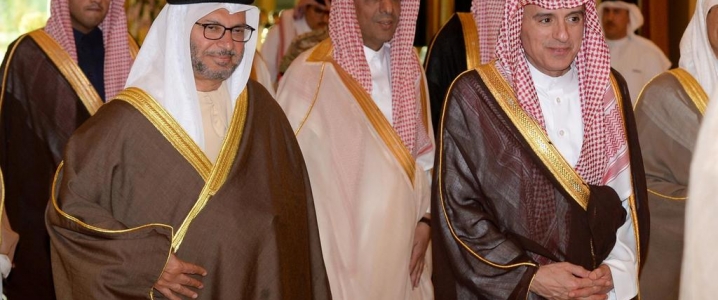www.aljazeerah.info
Opinion Editorials, December 2017
Archives
Mission & Name
Conflict Terminology
Editorials
Gaza Holocaust
Gulf War
Isdood
Islam
News
News Photos
Opinion Editorials
US Foreign Policy (Dr. El-Najjar's Articles)
www.aljazeerah.info
Middle East Tensions Near Boiling Point: GCC Implosion Will Impact Oil and Gas Volumes By Cyril Widdershoven Oil Price, Al-Jazeerah, CCUN, December 11, 2017 |
 |
 |
|
| UAE and Saudi foreign ministers in the GCC meeting in Kuwait, December 2017 |
The 38th Gulf Cooperation Council (GCC) Summit resulted in a showdown between Qatar and its Saud-led alliance counterparts.
Saudi King Salman decided to send a lower diplomatic delegation in his place, chipping away at the stability in the region. Additionally, in an unexpected move, Saudi Arabia and the United Arab Emirates (UAE) announced that the two countries have formed a new economic and military partnership, separate from the GCC. Arab analysts have already indicated that this could deal a deadly blow to the role of the GCC.
Officially, the decision made by UAE’s ruler Sheikh Khalifa bin Zayed Al Nayhan and the Saudi King is not linked to the ongoing Qatar crisis. However, the symbiosis currently showing between Saudi crown prince Mohammed bin Salman and Abu Dhabi’s crown prince Sheikh Mohammed bin Zayed is the main force behind this bilateral cooperation agreement.
The direct impact wasn’t clear within the first few hours of the GCC meeting. Analysts speculated how the news of the fresh Saudi-Emirati military and economic cooperation would impact the six-member GCC meeting. Until the new alliance was announced, the media was primarily focused on the ongoing Qatar crisis, especially due to the fact that the Qatari Emir was in attendance. Insiders, however, already expected that the new agreement would have a detrimental effect on the GCC meeting, given the impact of the council’s two main supporters decided to create their own military, political, and economic alliance.
Riyadh and Abu Dhabi have clearly been paving the way for a confrontation with Iran and Qatar for several months, while also setting up major economic projects in their own countries as they coordinate military operations in Yemen, Syria and Libya. Two weeks ago, Emirati analysts indicated that the UAE would take a primary role in regional conflicts, which has now come to the surface more clearly.
Several major conclusions now need to be drawn. First of all, the Saudi-Emirati move puts immense pressure on the other GCC countries to comply to the Riyad-Abu Dhabi axis point of views with regards to Doha and Tehran. It also shows that these two leading Gulf states have decided to put their own strategy in place, which is independent from the US-allied Gulf Arab nations planned by the GCC. It’s clear that both countries are even willing to confront Washington in their strategy towards Qatar, which still holds a major U.S. military base. The Abu Dhabi-Riyadh axis puts Washington under pressure to decide its own policies towards Qatar and Iran. With the increased pressure on the Trump administration, it also asks its Arab neighbors to pull ranks.
Washington and Europe have always been supportive of the GCC integration strategy. By cooperation, the Arab states are meant to be stronger in order to confront possible adversaries in the region, such as Iran, Syria or even Turkey. This, however, has been put on ice.
Cooperation between the Arab Gulf states has always been a difficult issue to navigate, as Oman, Kuwait and lately Qatar have shown. Qatar’s total rejection of the demands made by Saudi Arabia, UAE, Egypt, and Bahrain has already strengthened Doha’s relationship with Iran.
Analysts are watching this GCC meeting with anticipation. Hope for a détente between the fighting parties, however, is over. Instead of a political thaw, the armies are currently being called to the barracks for preparation of further action. The old adagio of “war is politics by other means” could now become a fact of life in the region. Without a real declaration, most GCC members have called it a day, and ended their participation of the Kuwait meeting two days earlier than planned. A crisis of unknown order could happen in front of our eyes.
The GCC was hit hard by these developments. It’s not yet dead, but currently hanging on by a thin thread. Not only will we see more infighting in the coming weeks, but the Saudi-Emirati move added fuel to the fire, especially considering neither the UAE nor Saudi Arabia even bothered to send their heads of state.
The region is seconds away from a full-blown catastrophe. Not only has the GCC cooperation taken a hard hit, but other regional developments are also taking a toll.
In the past few days, the Yemen War took a dramatic turn with the death of President Saleh following his decision to break military cooperation with the Houthis. The Iranian-backed Houthi militias have turned on Saleh supporters, further complicating the Saudi-Emirati efforts to find a solution to the bloody war.
Looking at the Qatar-Yemen issue, and the implosion of the GCC, a military confrontation is not an ideal fix. The current announcements and developments come just after Saudi Arabia held a meeting in Riyadh of the so-called Muslim Alliance or Arab NATO, a pan-Islamic coalition of 41 countries allegedly dedicated to fighting Islamic State militants in Iraq and Syria. The Islamic Military Counter Terrorism Coalition (IMCTC) is seen as a military force set up to confront Iran and its proxies, but Qatar could also be a future target. Saudi crown prince Mohammed bin Salman has put his full weight behind it, as he is the original instigator of the idea.
Since the alliance excludes non-Sunni countries, Iran, Syria and Iraq are not members. With no real positive results in Syria, a continuation of the Yemen war, and a creeping Iranian influence on its borders, Saudi Arabia is speeding up its efforts now to confront perceived threats. This strategy—supported by the UAE, Bahrain, Kuwait, Pakistan and Egypt—is now being established in steps, it seems. The UAE-Saudi military cooperation is currently a logical result.
On the military-economic front, the fog of war is thickening. However, outside of the heartland of confrontation, a new danger exists. Just after the OPEC meeting in Vienna concluded, and a show was made of cooperation and full compliance, internal dissent and confrontation between leading OPEC members has now fully surfaced.
As stated before, a war is brewing in the Middle East, which will have clear and direct repercussions on the oil (and gas) markets. If the current assessment is true, OPEC is heading for a showdown, not with U.S. shale or Vladimir Putin, but between its own members. Saudi Arabia and the Emirates have upped the ante, Qatar and Iran have to budge or confront the issue head on. We’ve yet to learn how well these OPEC members will follow their production and export strategies while hitting each other hard on other fields. More pressure on Doha and others will certainly lead to a situation where drastic measures will happen. The first one to budge will be hit the hardest.
This GCC implosion will have global side effects. Expect the first ripples as soon as financial analysts wake up and look at the larger geopolitical military picture that will have an impact on oil and gas volumes the coming months. Repercussions will be swift and hard, coming from unforeseen corners, but all leading toward a central point between Riyadh and Tehran. Doha’s geographical position isn’t too far away from this center of gravity.
https://oilprice.com/Geopolitics/Middle-East/Middle-East-Tensions-Near-Boiling-Point.html
***
Share the link of this article with your facebook friends
|
|
|
|
||
|
||||||


